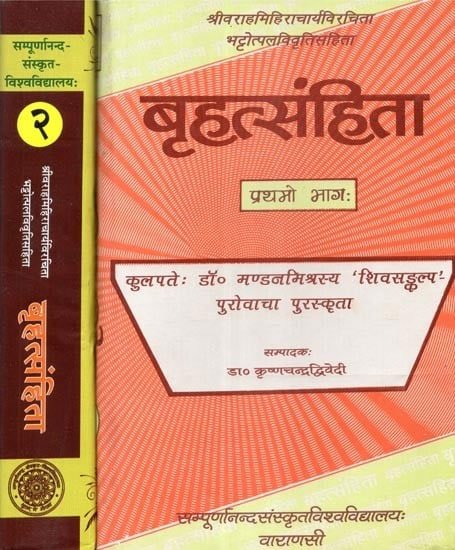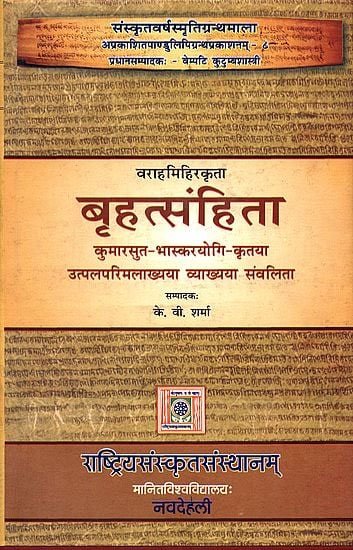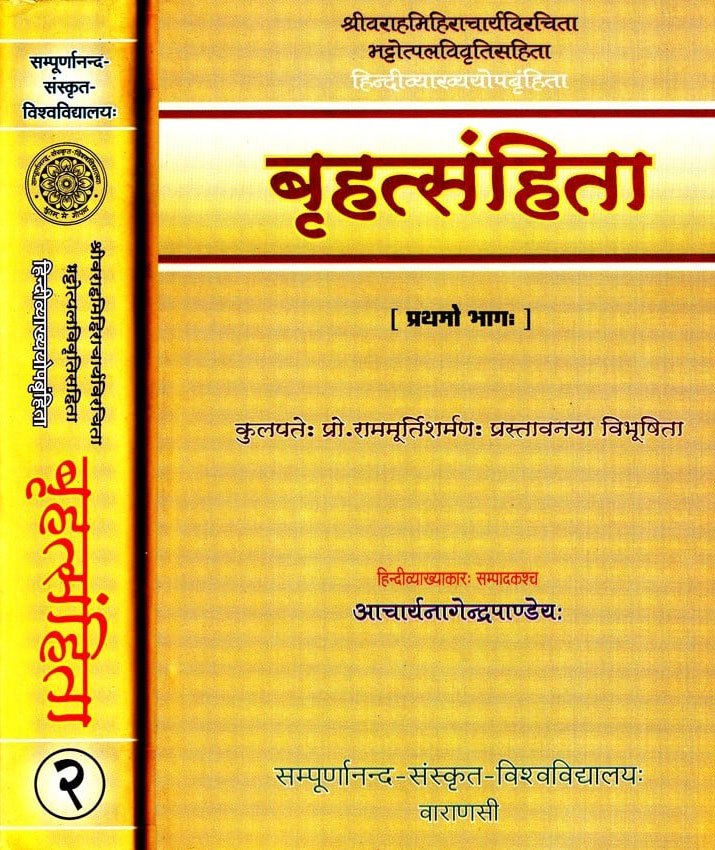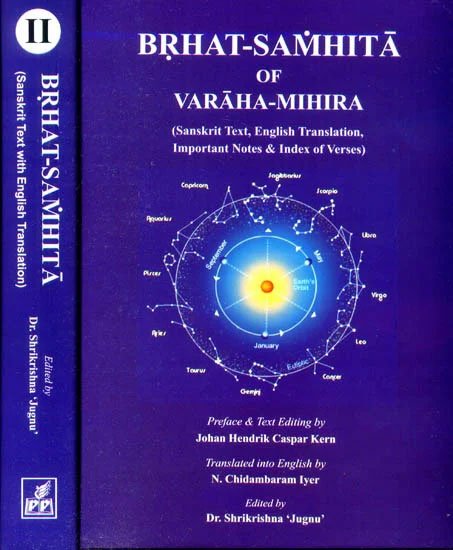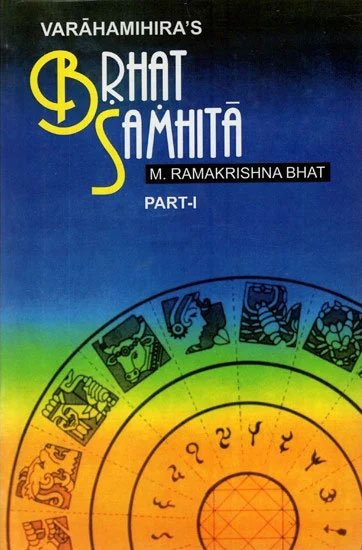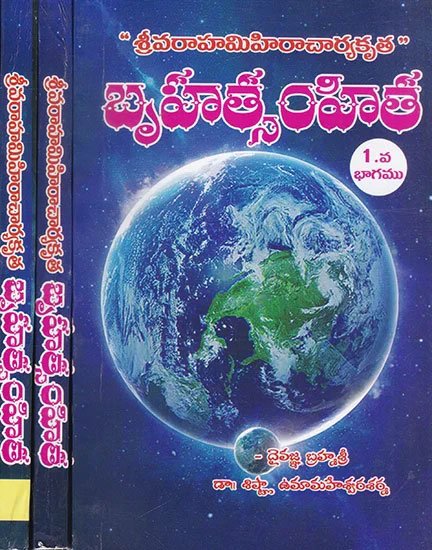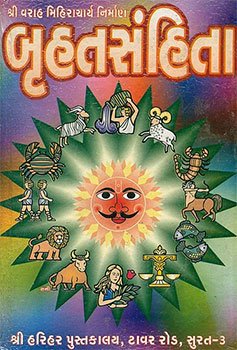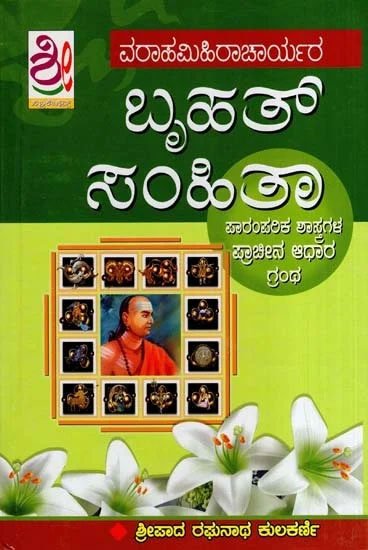Brihat-samhita [sanskrit]
26,560 words
The Sanskrit text of the Brihat-samhita from the 6th-century authored by Varaha Mihira in present-day Ujjain, India. It primarily deals with astrology and astronomy but is presented as an encyclopedia of knowledge.
Verse 19.10
मायेन्द्रजालकुहकाकरनागराणां गान्धर्वलेख्यगणितास्त्रविदां च वृद्धिः ।
पिप्रीषया नृपतयोऽद्भुतदर्शनानि दित्सन्ति तुष्टिजननानि परस्परेभ्यः ॥ १० ॥
māyendrajālakuhakākaranāgarāṇāṃ gāndharvalekhyagaṇitāstravidāṃ ca vṛddhiḥ |
piprīṣayā nṛpatayo'dbhutadarśanāni ditsanti tuṣṭijananāni parasparebhyaḥ || 10 ||
The Sanskrit text of Verse 19.10 is contained in the book Brihata Samhita (Sanskrit Text with Hindi Translation) by Pandit Achyutananda Jha. This book is available online or you could buy the latest edition:
Read online Buy now! The Sanskrit text by Pandit Achyutananda Jha (2001)
Glossary of Sanskrit terms
Note: This extracts Sanskrit terms and links to English definitions from the glossary, based on an experimental segmentation of verse (19.10). Some terms could be superfluous while some might not be mentioned. Click on the word to show English definitions.
Maya, Indrajala, Kuhaka, Agara, Gandharva, Lekhin, Lekhya, Aganita, Tri, Tra, Avida, Vriddhi, Piprisha, Nripati, Adbhutadarshana, Ditsat, Ditsanti, Tushtijanana, Paraspara,
Analysis of Sanskrit grammar
Note: this is an experimental feature and only shows the first possible analysis of the Sanskrit text (Verse 19.10). If the system was successful in segmenting the sentence, you will see of which words it is made up of, generally consisting of Nouns, Pronouns, Verbs, Participles and Indeclinables. Click on the link to show all possible derivations of the word.
- Line 1: “māyendrajālakuhakākaranāgarāṇāṃ gāndharvalekhyagaṇitāstravidāṃ ca vṛddhiḥ ”
- māye -
-
māya (noun, masculine)[compound], [vocative single], [locative single]māya (noun, neuter)[compound], [nominative dual], [vocative single], [vocative dual], [accusative dual], [locative single]√mā -> māya (absolutive)[absolutive from √mā]√mā -> māya (absolutive)[absolutive from √mā]√mā -> māya (absolutive)[absolutive from √mā]√man -> māya (absolutive)[absolutive from √man]√man -> māya (absolutive)[absolutive from √man]ma (noun, masculine)[dative single]ma (noun, neuter)[dative single]māyā (noun, feminine)[nominative single], [nominative dual], [vocative single], [vocative dual], [accusative dual]√mā (verb class 4)[present middle first single], [imperative active second single]
- indrajāla -
-
indrajāla (noun, neuter)[compound], [vocative single]
- kuhakā -
-
kuhaka (noun, masculine)[compound], [vocative single]kuhaka (noun, neuter)[compound], [vocative single]kuhakā (noun, feminine)[nominative single]
- akaran -
-
√kṛ (verb class 1)[imperfect active third plural]
- āgarāṇām -
-
āgara (noun, masculine)[genitive plural]
- gāndharva -
-
gāndharva (noun, masculine)[compound], [vocative single]gāndharva (noun, neuter)[compound], [vocative single]
- lekhya -
-
lekhin (noun, masculine)[compound], [adverb], [nominative single]lekhin (noun, neuter)[compound], [adverb], [nominative single], [vocative single], [accusative single]lekhya (noun, masculine)[compound], [vocative single]lekhya (noun, neuter)[compound], [vocative single]√likh -> lekhya (participle, masculine)[compound from √likh]√likh -> lekhya (participle, neuter)[compound from √likh]√likh -> lekhya (absolutive)[absolutive from √likh]√likh -> lekhya (participle, masculine)[vocative single from √likh class 6 verb], [vocative single from √likh]√likh -> lekhya (participle, neuter)[vocative single from √likh class 6 verb], [vocative single from √likh]
- agaṇitās -
-
agaṇita (noun, masculine)[nominative plural], [vocative plural]agaṇitā (noun, feminine)[nominative plural], [vocative plural], [accusative plural]
- tra -
-
tṛ (noun, neuter)[compound], [adverb], [nominative single], [vocative single], [accusative single]tra (noun, masculine)[compound], [vocative single]tra (noun, neuter)[compound], [vocative single]
- avidā -
-
avida (indeclinable)[indeclinable]
- am -
-
a (noun, masculine)[adverb], [accusative single]ā (noun, feminine)[adverb]e (noun, masculine)[accusative single]
- ca -
-
ca (indeclinable conjunction)[indeclinable conjunction]ca (noun, masculine)[compound], [vocative single]ca (noun, neuter)[compound], [vocative single]
- vṛddhiḥ -
-
vṛddhi (noun, feminine)[nominative single]vṛddhi (noun, masculine)[nominative single]
- Line 2: “piprīṣayā nṛpatayo'dbhutadarśanāni ditsanti tuṣṭijananāni parasparebhyaḥ ”
- piprīṣayā -
-
piprīṣā (noun, feminine)[instrumental single]
- nṛpatayo' -
-
nṛpati (noun, masculine)[nominative plural], [vocative plural]
- adbhutadarśanāni -
-
adbhutadarśana (noun, neuter)[nominative plural], [vocative plural], [accusative plural]
- ditsanti -
-
√dā -> ditsantī (participle, feminine)[adverb from √dā]√dā -> ditsat (participle, neuter)[nominative plural from √dā], [vocative plural from √dā], [accusative plural from √dā]√dā -> ditsantī (participle, feminine)[vocative single from √dā]√dā (verb class 0)[present active third plural]
- tuṣṭijananāni -
-
tuṣṭijanana (noun, neuter)[nominative plural], [vocative plural], [accusative plural]
- parasparebhyaḥ -
-
paraspara (noun, masculine)[dative plural], [ablative plural]paraspara (noun, neuter)[dative plural], [ablative plural]
Other editions:
Also see the following editions of the Sanskrit text or (alternative) English translations of the Verse 19.10
Brhatsamhita with the Commentary of Bhattotpala
by Krishna Chandra Dwivedi (2016)
Publisher: Sampurnanand Sanskrit University; 1229 pages;
Buy now!
Brihat Samhita with the Commentary of Utpalapatimala of Yogisvara
by K. V. Sharma (2012)
Publisher: Rashtriya Sanskrit Sansthan, Janakpuri; 754 pages; ISBN-10; 8186111360; ISBN-13: 9788186111369
Buy now!
Brihat Samhita (Hindi Translation)
by K. V. Sharma (2002)
Publisher: Sampurnanand Sanskrit University; 2359 pages; ISBN-13: 9789387890008.
Buy now!
Brhat Samhita (English translation)
by N. Chidambaram Iyer (2022)
Publisher: Parimal Publication Pvt. Ltd.; 801 pages; Edited by Dr. Shrikrishna Jugnu; ISBN-10: 8171104215; ISBN-13: 9788171104215.
Buy now!
Brhat Samhita (English with notes)
by M. Ramakrishna Bhat (2010)
Publisher: Motilal Banarsidas Publishers Pvt. Ltd.; 1155 pages; ISBN-10: 8120810600; ISBN-13: 9788120810600.
Buy now!
Brhat Samhita (Telugu translation)
by Sishtla Umamaheswara Sharma (2020)
Publisher: Mohan Publications, Andhra Pradesh; 846 pages.
Buy now!Preview of verse 19.10 in Kannada sript:
ಮಾಯೇನ್ದ್ರಜಾಲಕುಹಕಾಕರನಾಗರಾಣಾಂ ಗಾನ್ಧರ್ವಲೇಖ್ಯಗಣಿತಾಸ್ತ್ರವಿದಾಂ ಚ ವೃದ್ಧಿಃ ।
ಪಿಪ್ರೀಷಯಾ ನೃಪತಯೋಽದ್ಭುತದರ್ಶನಾನಿ ದಿತ್ಸನ್ತಿ ತುಷ್ಟಿಜನನಾನಿ ಪರಸ್ಪರೇಭ್ಯಃ ॥ ೧೦ ॥
Brhat Samhita (Gujarati translation)
by - (2000)
Publisher: Shree Harihar Pustakalay, Surat; Author: Shri Varahamihira Acharya (શ્રી વરાહમિહીરાચાર્ય); 432 pages.
Buy now!Preview of verse 19.10 in Gujarati sript:
માયેન્દ્રજાલકુહકાકરનાગરાણાં ગાન્ધર્વલેખ્યગણિતાસ્ત્રવિદાં ચ વૃદ્ધિઃ ।
પિપ્રીષયા નૃપતયોઽદ્ભુતદર્શનાનિ દિત્સન્તિ તુષ્ટિજનનાનિ પરસ્પરેભ્યઃ ॥ ૧૦ ॥
Brhat Samhita (Kannada translation)
by Sripada Raghunatha Kulkarni (2021)
Publisher: Srinidhi Publications, Bangalore; 668 pages with illustrations.
Buy now!Preview of verse 19.10 in Kannada sript:
ಮಾಯೇನ್ದ್ರಜಾಲಕುಹಕಾಕರನಾಗರಾಣಾಂ ಗಾನ್ಧರ್ವಲೇಖ್ಯಗಣಿತಾಸ್ತ್ರವಿದಾಂ ಚ ವೃದ್ಧಿಃ ।
ಪಿಪ್ರೀಷಯಾ ನೃಪತಯೋಽದ್ಭುತದರ್ಶನಾನಿ ದಿತ್ಸನ್ತಿ ತುಷ್ಟಿಜನನಾನಿ ಪರಸ್ಪರೇಭ್ಯಃ ॥ ೧೦ ॥
![Brihat-samhita [sanskrit] - book cover](/uploads/a/Brihat-Samhita-Sanskrit.jpg)
